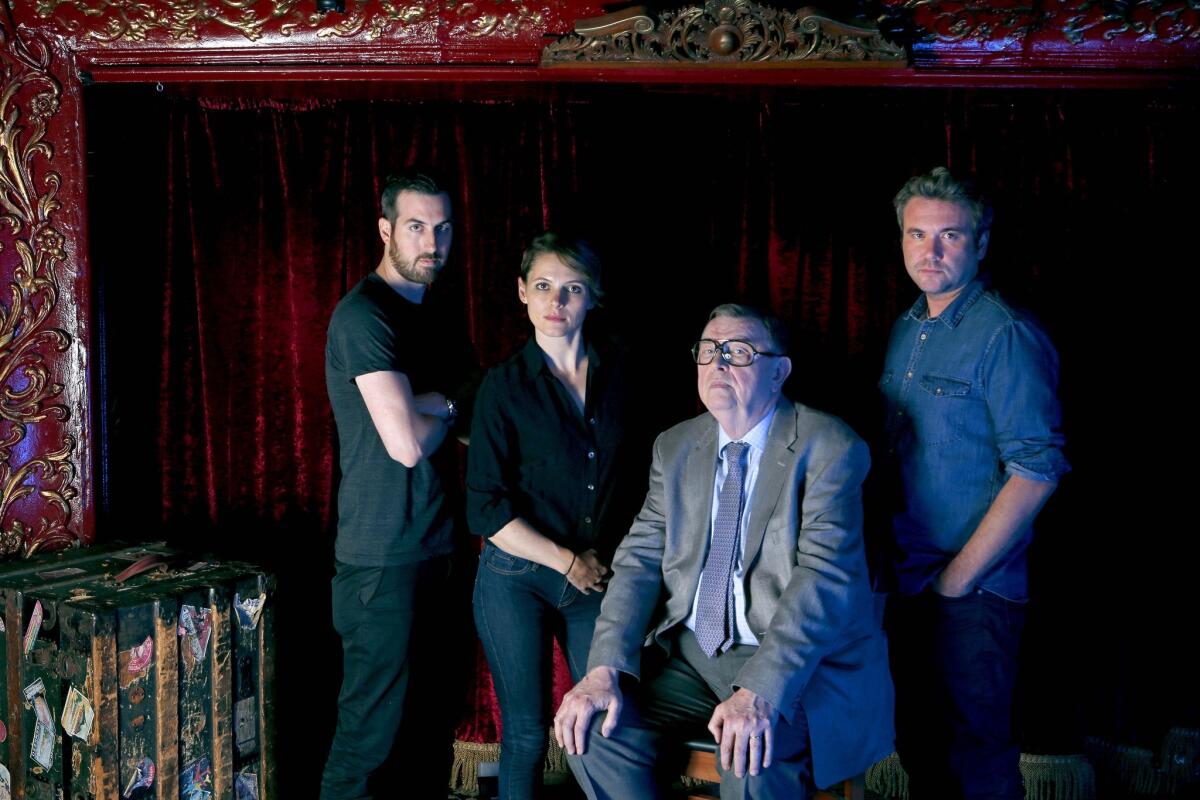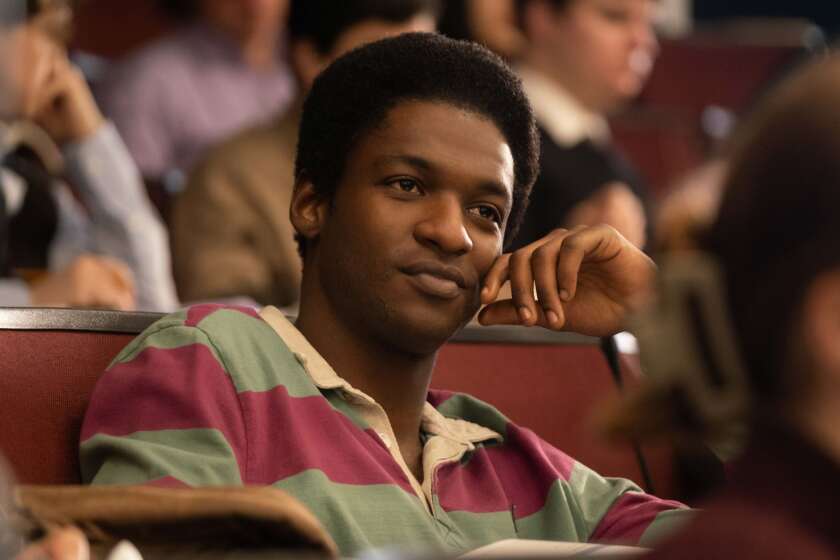Indie Focus: Ti West’s ‘The Sacrament’ finds horror in a realistic cult tale

Filmmaker Ti West has emerged as one of the freshest voices on the indie horror scene with films such as “The House of the Devil” and “The Innkeepers,” knowingly playing with audiences’ expectations and the genre rule book. So with his most recent film, “The Sacrament,” he set out to move beyond the supernatural scares of horror to the terror of reality itself.
“I wanted to do something radically different,” said West. “And I’d never done anything like this before. It’s certainly more horrific than any movie I’ve made, but some people don’t think it’s a horror movie.”
Opening June 6 in Los Angeles and already available on demand, the film is a fictionalized recasting of a mass murder-suicide like what happened in November 1978 in Guyana with Jim Jones and the Peoples Temple. Shot in the style of a documentary, when the film turns from creepy to violent — a throat slashed, a suicidal gunshot, someone set on fire — the aura of realism makes it all the more powerful and shocking.
“It was important to me that all the violence in the movie not be enjoyable, that every element of violence be confronting and sort of upsetting,” said West. “I need for people to almost want to leave. Even people who are really into violence in cinema, when confronted with it in the context of this movie, it should make them feel uncomfortable.”
In the film Patrick (Kentucker Audley), a New York fashion photographer, gets word that his troubled sister Caroline (Amy Seimetz) has traveled with a cult to another country. Heading off to find her, he is joined by his friends Sam (AJ Bowen) and Jake (Joe Swanberg), video journalists for Vice. Flown by helicopter to a remote woodland compound known as Eden Parish, they meet Father (Gene Jones), the charismatic, enigmatic leader of the group. Things seem benign, even positive, at first, until events escalate and Father sets in motion a catastrophic final plan.
The film’s intense performances emerge in part from a tightknit group of collaborators. West, Bowen, Swanberg and Seimetz had all recently acted together in the home invasion horror film “You’re Next.” Audley starred in Seimetz’s film “Sun Don’t Shine” alongside actress Kate Lyn Sheil, who also has a supporting role in “The Sacrament.”
The outsider to the group was Jones. West noticed the veteran character actor when he appeared on an episode of the television show “Louie” as a pharmacist, though many will know him best from “No Country for Old Men,” where a coin flip with Javier Bardem became one of the movie’s signature scenes.
It was Jones’ essential good-natured quality that was the very thing which appealed to West. “No one can see him as an evil or bad person or no one would be there,” said the Delaware-born, Los Angeles-based West, 33.
For Jones, who described the character as “a man who was evil but not mean,” the role presented the challenge of not seeming too sinister too soon. “I did take the good things Father said to be absolutely honest,” Jones said. “And the poison in the well is the paranoia that the outside world will never understand them.”
Among the producers on the film is Eli Roth, who was also involved in the earlier faux documentary “The Last Exorcism.” Taking over a large piece of property that West described as “just one guy’s backyard” only a short drive from downtown Savannah, Ga., the production created a 360-degree environment for shooting the Eden Parish compound.
The actors all had to adjust to the film’s shooting style and creating a sense of events unfolding in real time. Once she adjusted to the rhythm of the shoot, Seimetz discovered “it started to be fun to use the camera as a suspense element in your performance, looking at the camera and changing how those looks seem from scene to scene.”
The implied realism of the documentary shooting style builds to an emotional final confrontation between Seimetz and Audley that left the actress “maxed-out and exhausted.” “There is something uneasy about it. I don’t know if it’s right or wrong,” added Seimetz of the volatile feelings conjured by the film. “I mean this in a positive way, but in a way I haven’t reconciled what it is we did.”
For West, the Jonestown massacre has long held a dark fascination. For him it stands in distinction from other group deaths such as the Heaven’s Gate mass suicide in San Diego or the government standoff with David Koresh and his followers in Texas.
“I think people misunderstand it because it’s become part of pop culture, ‘Oh, they drank the Kool-Aid,’” said West. “I think people have this idea of brainwashed mindless zombies who thought they were going to heaven. And that’s not really fair. It’s far denser than that.
“It’s much more a mass murder than a mass suicide, because those people didn’t have much of a choice,” he added of the more than 900 people who died in Jonestown. “You can’t say, No, thanks’ and walk out of there. So a lot of them felt so desperate and so hopeless. You may not want to die, but what’s the option?”
In framing the film as a fake documentary West was able to give it an additional contemporary spin by adding in the brand-recognition of Vice, the alternative lifestyle conglomerate that has branched out into video journalism. (And which approved use of its name in the film.)
“That was the thing that was initially exciting to me, working within the context of this brand and maybe the detached person that goes with it,” said Audley. “My character starts off very cool and above it all and then things shift to where this person has to deal with life-or-death situations. You’re too cool to care and then you’re dying.”
West was excited that the film had its world premiere last fall as part of the prestigious Venice Film Festival, also playing at the Toronto International Film Festival outside the bounds of the horror-heavy Midnight Madness section. All this was to signal that “The Sacrament” was something different from the feeling of a more typical horror film — or as Bowen said half-joking, “we bring the introspective sadness.”
The largely positive reception the film has received has been further encouragement for West.
“It shows people who like horror movies do want to see different kinds of horror movies. The horror genre is so great because you can do anything in it,” said West. “It’s easy to appease the lowest common denominator, I get it, but people want to see other stuff too, they just don’t have it to see.”
More to Read
Only good movies
Get the Indie Focus newsletter, Mark Olsen's weekly guide to the world of cinema.
You may occasionally receive promotional content from the Los Angeles Times.











